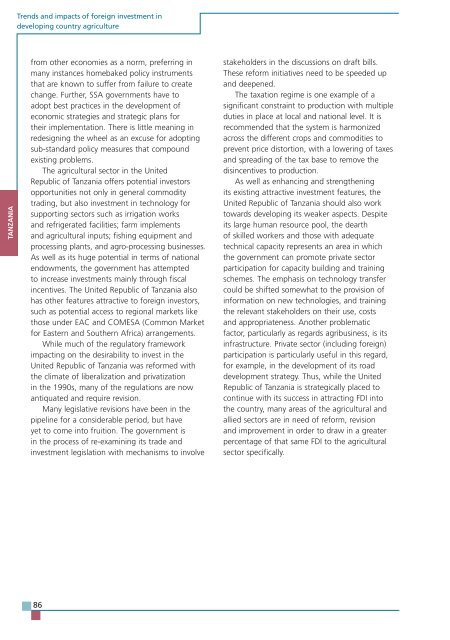TRENDS AND IMPACTS OF FOREIGN INVESTMENT IN DEVELOPING COUNTRY AGRICULTURE
TRENDS AND IMPACTS OF FOREIGN INVESTMENT IN DEVELOPING COUNTRY AGRICULTURE
TRENDS AND IMPACTS OF FOREIGN INVESTMENT IN DEVELOPING COUNTRY AGRICULTURE
Create successful ePaper yourself
Turn your PDF publications into a flip-book with our unique Google optimized e-Paper software.
TANZANIA<br />
Trends and impacts of foreign investment in<br />
developing country agriculture<br />
from other economies as a norm, preferring in<br />
many instances homebaked policy instruments<br />
that are known to suffer from failure to create<br />
change. Further, SSA governments have to<br />
adopt best practices in the development of<br />
economic strategies and strategic plans for<br />
their implementation. There is little meaning in<br />
redesigning the wheel as an excuse for adopting<br />
sub-standard policy measures that compound<br />
existing problems.<br />
The agricultural sector in the United<br />
Republic of Tanzania offers potential investors<br />
opportunities not only in general commodity<br />
trading, but also investment in technology for<br />
supporting sectors such as irrigation works<br />
and refrigerated facilities; farm implements<br />
and agricultural inputs; fishing equipment and<br />
processing plants, and agro-processing businesses.<br />
As well as its huge potential in terms of national<br />
endowments, the government has attempted<br />
to increase investments mainly through fiscal<br />
incentives. The United Republic of Tanzania also<br />
has other features attractive to foreign investors,<br />
such as potential access to regional markets like<br />
those under EAC and COMESA (Common Market<br />
for Eastern and Southern Africa) arrangements.<br />
While much of the regulatory framework<br />
impacting on the desirability to invest in the<br />
United Republic of Tanzania was reformed with<br />
the climate of liberalization and privatization<br />
in the 1990s, many of the regulations are now<br />
antiquated and require revision.<br />
Many legislative revisions have been in the<br />
pipeline for a considerable period, but have<br />
yet to come into fruition. The government is<br />
in the process of re-examining its trade and<br />
investment legislation with mechanisms to involve<br />
86<br />
stakeholders in the discussions on draft bills.<br />
These reform initiatives need to be speeded up<br />
and deepened.<br />
The taxation regime is one example of a<br />
significant constraint to production with multiple<br />
duties in place at local and national level. It is<br />
recommended that the system is harmonized<br />
across the different crops and commodities to<br />
prevent price distortion, with a lowering of taxes<br />
and spreading of the tax base to remove the<br />
disincentives to production.<br />
As well as enhancing and strengthening<br />
its existing attractive investment features, the<br />
United Republic of Tanzania should also work<br />
towards developing its weaker aspects. Despite<br />
its large human resource pool, the dearth<br />
of skilled workers and those with adequate<br />
technical capacity represents an area in which<br />
the government can promote private sector<br />
participation for capacity building and training<br />
schemes. The emphasis on technology transfer<br />
could be shifted somewhat to the provision of<br />
information on new technologies, and training<br />
the relevant stakeholders on their use, costs<br />
and appropriateness. Another problematic<br />
factor, particularly as regards agribusiness, is its<br />
infrastructure. Private sector (including foreign)<br />
participation is particularly useful in this regard,<br />
for example, in the development of its road<br />
development strategy. Thus, while the United<br />
Republic of Tanzania is strategically placed to<br />
continue with its success in attracting FDI into<br />
the country, many areas of the agricultural and<br />
allied sectors are in need of reform, revision<br />
and improvement in order to draw in a greater<br />
percentage of that same FDI to the agricultural<br />
sector specifically.


